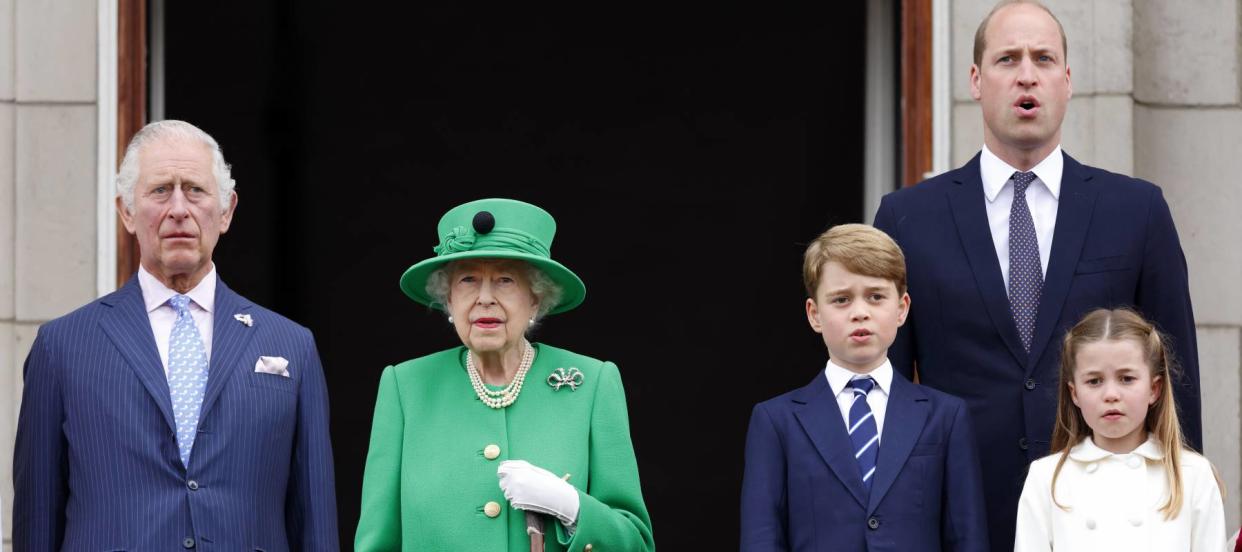Queen Elizabeth’s estimated $500 million fortune is part of a bigger $28 billion empire. This is how her wealth is going to be passed down

- Oops!Something went wrong.Please try again later.
Queen Elizabeth II, who died on Sept. 8, was the head of state of 14 Commonwealth realms, including Canada.
Passing at the age of 96, Elizabeth left a long legacy after becoming the U.K.'s longest-serving monarch — reigning for 70 years.
Not only was she the Queen of England, she was a wealthy woman in her own right.
With British monarchs not required to reveal their assets, different media outlets have pitched in with their estimates.
The Queen’s personal wealth totals more than US$500 million in assets she accumulated over her decades on the throne, according to Forbes.
British media outlet, the Sun, estimates her net worth to be $3 billion, and the Sunday Times Rich List 2022 said the Queen’s net worth was around $420 million.
The Royal Family have accumulated wealth through centuries of rule and here's a look at what will happen to that wealth as the Queen is laid to rest and her son Charles assumes the throne.
Don't miss
This company carries out your life's wishes if you're no longer around to do it yourself
You could be the landlord of Walmart, Whole Foods and Kroger (and collect fat grocery store-anchored income on a quarterly basis)
What do Ashton Kutcher and a Nobel Prize-winning economist have in common? An investing app that turns spare change into a diversified portfolio
How did the Queen accumulate wealth?
Elizabeth II inherited about $81 million from her mother, Queen Elizabeth, when the monarch died in 2002. The inheritance included assets like paintings, a valuable Faberge egg collection, china, jewellery and even horses.
Overall, the Queen didn’t receive a traditional annual salary. Like other Royal Family members she received income through a taxpayer fund called the Sovereign Grant, which amounted to more than 86 million pounds (almost $100 million) in 2021 and 2022. The Sovereign Grant is geared to cover official travel, property maintenance plus the operating costs of the Queen’s London residence — Buckingham Palace.
The Sovereign Grant finds its roots in an agreement struck by King George III to surrender his income from Parliament in order to receive a fixed annual payment for himself and future generations of the royal family.
Following her death, King Charles is going to receive the yearly Sovereign Grant from the U.K. Treasury. He will be getting 15% of the profits from the Crown Estate.
The Queen’s wealth is in fact part of a larger empire worth approximately $28 billion, according to Forbes.
Included in the $28 billion empire are Crown Estate holdings belonging to the British monarchy that are worth $19.5 billion. There are also properties such as Buckingham Palace and Kensington Palace, which are collectively worth over $5 billion.
Who inherits her wealth?
Like the crown itself, most of the Queen’s personal wealth will go to Prince Charles, in accordance with a protocol laid out before her death.
Unlike other Brits, Charles is going to receive his inheritance tax free in accordance with a special legal clause that allows it. However, gifts left to other children or relatives will be taxed at 40%, the customary inheritance tax for the U.K.
How about the children?
Prince William, the eldest son of now King Charles, along with his wife Kate Middleton, were long known as the Duke and Duchess of Cambridge.
However, their social media accounts are now changed to the Duke and Duchess of Cornwall and Cambridge. And yes, there is an inheritance significance to this.
King Charles has now passed the estate of the Duchy of Cornwall — which spreads across 20 counties in England, and is estimated to be worth around $1.3 billion — to his eldest son.
It has been a custom for the past 700 years that the duchy, which also translates to “duke’s lands”, be passed down from eldest son to eldest son, along with the title of Duke of Cornwall.
This cuts Prince Harry and William's youngest son Prince Louis from the inheritance. Rather, the next in line is William's eldest child, Prince George, who is nine.
How about the Queen’s other children?
While the vast majority of inheritance is heading toward the new King, it isn’t clear if there is going to be inheritance received by the Queen’s three other children.
In addition to King Charles, the Queen had Prince Andrew, Princess Anne and the youngest Prince Edward.
Charles’s father, the late Prince Phillip, always wanted to pass his title as the Duke of Edinburgh to his youngest son the Earl of Wessex. That decision now lies with Charles, the new King.
Prince Andrew, who is still a prince, is no longer allowed to use 'His Royal Highness' (HRH) title following the scandal linking him with Jeffrey Epstein.
What to read next
Too many Americans are still missing out on cheaper car insurance
A TikToker paid off $17,000 in credit card debt by 'cash stuffing' — can it work for you?
High prices, rising interest rates and a volatile stock market — here’s why you need a financial advisor as a recession looms
This article provides information only and should not be construed as advice. It is provided without warranty of any kind.

